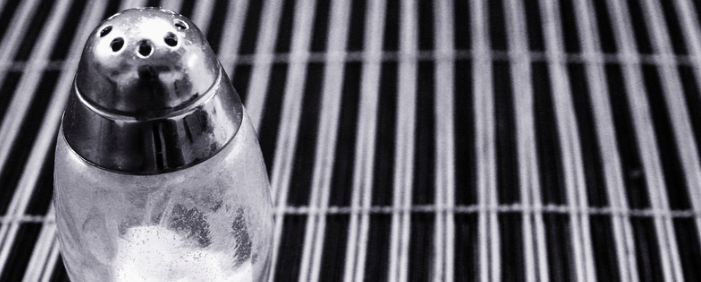
“With what do I weed our terrace? ”
Salt! ”
” Are you sure this is not some toxic? ”
” Nah, I assure you, the salt is natural! “
We see more and more this kind of dialogues, between gardeners or Facebook forums or gardening groups: salt, the ultimate solution as a ” natural ” weed killer . Really? We knew the use of vinegar in the garden (and in the house in general!), But the salt – it is gardening , not a vinaigrette ! So, with Groww’s friends, we wanted to check. If you do not want to know more, we tell you everything: it’s toxic! . If you are curious, we explain below:
What is salt?
Chemically, sodium chloride – our table salt, flavor enhancer. It is put in the water pasta or salad, but once washed and on the plate, not when the lettuce is still standing.
There are plants that like salt!
The plants that tolerate salt are called halophytes : think of the plants of seaside, deserts, marshes or salt lakes. There are also halophytes called “obligatory” that survive only if they are in the presence of high salinity levels – this is the case of samphire winemakers for example – and “optional” halophytes, which tolerate these same concentrations but will normally develop without.
For other plants, salt is a poison
For all other plants, salt is a real poison : it limits the ability of the plant to feed on essential elements to its development, it harms its hydration , and in the long term, it kills the life of the soil of which it is feeds.
- Dissolved in water, salt releases its ions that will tend to substitute for other ions present on soil aggregates such as potassium , calcium or magnesium , which are found less available to plants.
- In addition, a high concentration of salt in the soil makes it difficult to absorb water from the rootsbecause there is competition for water between the soil and the plant due to the osmotic pressures of the two media. In the presence of a high concentration of salt in the soil, the osmotic pressure of the soil water is greater than the osmotic pressure of the water contained in the plant.
- The presence of salt also acts on the structure of the soil – settlement, decreased permeability – which further reinforces the difficulties of water supply of the plant.
- Not to mention, of course, the very harmful influence of salt on soil life – the precious worms, and other collembola , myriapoda etc.
Suddenly, salt as weed killer, it is effective – and virtually total , if we exclude plants halophytes. But it’s toxic . Why?
Salt in your floors just does not deteriorate
Salt is natural, it is found on our planet in almost unlimited quantities . But it is not painless: the problem is that once you have poured salt on your soil, well, it remains there … The principle of a living soil requires that everything be consumed, digested, transformed. It is sometimes recommended the use of vinegar to weed: it is much less worse – besides there are some weeders called “bios” sold in commerce that are only acetic acid , a word a little complicated for say alcohol vinegar: use basic vinegar, it will be cheaper! In short, the vinegar decomposes rather quickly, is degraded, its “weeding” effect does not last.Salt, on the other hand, does not degrade , it stays in your soil. No one in your garden consumes it – except you, on fries.
It’s the same problem with the salt that we use on the roads, and that many people have long condemned for its harmful effects .
Pollution is a matter of dosing
It is often believed that “natural” solutions as opposed to “chemical solutions” should be preferred. This is rather misunderstanding the problem: more than components, in terms of pollution everything is often a matter of dosage . The argument of the “natural” product that would be “nontoxic” does not hold: arsenic is a violent poison, and yet, each of us carries in his own body, in minute doses! Nitrogen, contained in our urine and so beneficial to our vegetable gardens because of a few diluted watering cans – click, the article on the benefits of human urine in the kitchen garden ! – can become a major pollution when concentrations become stronger! The concentrated nettle manure also acts as a weed killer for the same reasons: localized pollution , but pollution all the same, with nitrogen.
So it’s a matter of dosing , and suddenly, two things one: either you put little salt, and it will not weed, or you put a lot, and you degrade your soil.